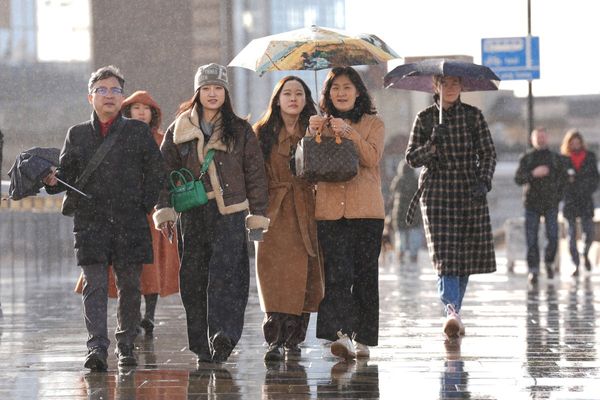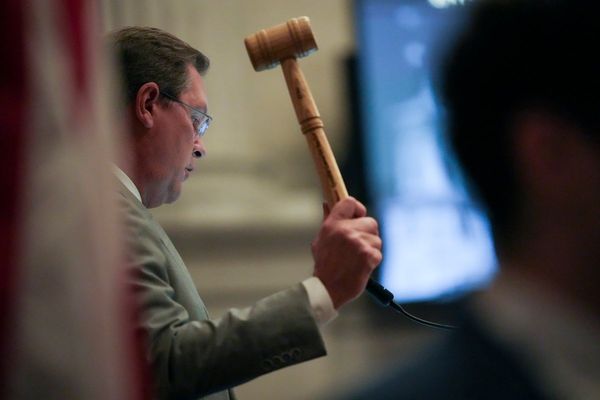
Prince of Parties We got a little reminder over the last week, if any were needed, of just how many barriers to freedom of information (FOI) exist in this country.
In September 2019 there was a garden party held at the Australian ambassador’s residence in Washington DC, hosted by then prime minister Scott Morrison and treasurer turned US ambassador Joe Hockey. That same week, William Summers, AAP FactCheck’s chief journalist, put in an FOI request for the guestlist. The Department of Foreign Affairs and Trade (DFAT) claimed that publishing the guestlist was likely to damage Australia’s international relations and that it would breach the personal privacy of the guests who attended. Summers took the case to the information commissioner.
“I … made the case that the Australian embassy in Washington had already published dozens of photos of the event on Flickr and even invited a few journalists along to the bash,” Summers told Crikey.
Further, “the idea that 300 guests at an Australian government garden party would have thought their attendance was secret just doesn’t pass the sniff test”.
The Morrison and Albanese governments both fought the release.
Summers persisted, and a mere four and a half years later, DFAT was ordered to hand over the guestlist by the commissioner.
The list makes for an interesting read beyond the various high-profile attendees who’d already been identified. It confirms that Australian business luminaries Anthony Pratt, Andrew Forrest, Kerry Stokes, Gina Rinehart and then Rio Tinto CEO Jean-Sébastien Jacques all got an invite.
But we now know, thanks to Summers’ work, that then head of Australian defence staff in Washington Alan Clements was there, as was Dow Chemical’s Andrew Liveris. Within a year Clements would be working for Hockey’s new consultancy and Liveris would be on Morrison’s opaque National COVID-19 Co-ordination Commission.
Also notable on the party guestlist, particularly after The Washington Post’s report on the “extraordinary degree” to which “Australia has relied on high-priced American consultants to decide which ships and submarines to buy”, were retired US admirals William Hilarides and Thomas Eccles. We spent millions — a drop in the ocean compared to what AUKUS will eventually cost — for their advice.
“In some ways, it feels pointless to fight for the guestlist of a garden party that happened nearly five years ago, but I knew if I gave up, similar FOI requests about future events would similarly be kicked into the long grass,” Summers said.
“Rulings by the information commissioner set a precedent for future cases, meaning that, in theory at least, it will be harder for departments to use the same arguments to keep guestlists hidden in future.”
A round of doxxing As we have covered elsewhere in today’s Crikey, our political class is deeply, deeply concerned at the scourge of “doxxing”. So we imagine the prime minister is going to be just furious when he hears about this:
- In 2015 then Labor senator Sam Dastyari released the names of executives from some of Australia’s biggest companies that he alleged had engaged in corrupt behaviour.
- In 2022 the late Labor senator Kimberley Kitching named one of Australia’s biggest political donors, calling him a “puppeteer” behind a foreign interference campaign in Australia.
- In 2020 Labor shadow assistant treasurer Stephen Jones named a Liberal MP accused of “rorting of taxpayer funds for political purposes” and attempts to undermine other Liberal MPs — claims the MP denied and was later cleared of.
- Also in 2020 Labor Senator Deborah O’Neill named a senior partner at Big Four consultants EY who had allegedly engaged in a “clear conflict of interest” and “breach of professional standards”. She also revealed claims “of partners being under the influence of alcohol, behaving inappropriately and sometimes undermining, humiliating and ostracising officers in the presence of other employees while off premises, as well as officers coming to work under the influence of illicit drugs in a desperate attempt to fiercely compete for that sales credit”.
We could go on and on. How is this relentless doxxing allowed to continue? Via the use of parliamentary privilege, which allows MPs to say whatever they like in Parliament free from any legal constraints regarding privacy or defamation. We look forward to a serious rethink of this exemption as part of this suite of rules.
Will of Burke All this talk of a legislated “right to disconnect”, spearheaded by Industrial Relations Minister Tony Burke, has inevitably led to questions about Parliament as a famously toxic workplace where workers are subjected to long, long hours and rigorous demands and in some cases much, much worse.
Indeed, Community and Public Sector Union national secretary Melissa Donnelly has promised to fight to enforce that right for MPs’ staff just as surely as for any other cohort of workers. Apropos of nothing, we wonder if any members of Burke’s team, watching him fight to give workers the power to properly clock off, have any wry memories of the time he held a press conference at midnight while in opposition to make a point about penalty rates and the gig economy.







